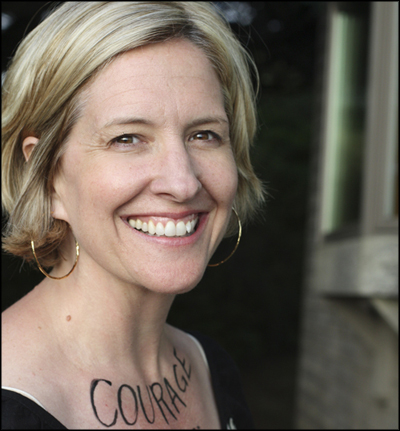Brené Brown's TED Talks: Vulnerability, Wholeheartedness, and the Epidemic of Shame

Brené Brown is a big-hearted, über-thoughtful Texan research professor at the University of Houston Graduate College of Social Work. She has spent a decade of her life studying the effects of “vulnerability, courage, authenticity, and shame” on the day-to-day human experience. Both of her TED talks have gone megaviral, for understandable reasons. She bravely asks her audience to parse and confront the following quandaries:
How do we learn to embrace our vulnerabilities and imperfections so that we can engage in our lives from a place of authenticity and worthiness? How do we cultivate the courage, compassion, and connection that we need to recognize that we are enough – that we are worthy of love, belonging, and joy?
Here’s Brown’s first TED talk, from 2011, called “The Power of Vulnerability”:
Talk number two, from 2012, is called “Listening to Shame”:
Brown puts her finger on some extremely tender universal trigger points, and presses with gentle frankness. If you haven’t watched them yet, both of these talks are highly recommended viewing on a quiet Sunday afternoon.

May 20th, 2012 at 6:43 am
I don’t know, I think it sounds overly apologetic. It’s not that our shame is undeserved, it’s that our shame is misplaced. We allow the orthodox religions to own values and ethics and morals, when none of those are copyrightable. And then those of religious conviction tend to be the harshest offenders. Virtues have somehow become “sissy-fied” in the modern world, like some bizarre sign of weakness. Such concepts are rendered impotent because of the mass frequency by which our elected leaders and our business leaders totally renege. When the genuine article appears before us it seems like a cartoon, or a poseur. I think everyone, as a society and as individuals should acknowledge their own causes for shame. It has to be necessary, or how else can we honestly value our own self-worth?
May 20th, 2012 at 11:24 am
I think you’re missing the point a bit, Richard.
There’s a difference between acknowledging our failings, seeing where we don’t measure up to the standards we set for ourselves, or where we are insufficiently virtuous, and being ashamed. Being honest with yourself about your failings allows you to grow, but being ashamed of those failings tends to stifle growth.
Because most people, when they feel shame about something, they just want to hide it away, to not have to face that thing because of how bad it makes them feel. You can’t change, grow, and overcome your faults by being ashamed of them. Virtue only comes from shame in the most negative and indirect manner, through avoidance and fear.
May 20th, 2012 at 4:32 pm
All I will say is that these talks moved me deeply, have incalculable personal relevance and resonance, and I came away from them with a great deal of clarity and gratitude.
May 20th, 2012 at 10:57 pm
I halfway disagree, MS. I think shame does have a place, and that it can indeed be a very potent catalyst for change. And not just in a “still trying to disassociate from Roman Catholic upbringing” kinda way. A world entirely without shame would be anarchy in the worst possible connotation.
May 21st, 2012 at 8:08 am
I find that argument unconvincing, Richard. It has the same paternalistic connotations that invoking a fear of punishment to explain good behavior has. How many times have I heard people, in all earnestness, state that without the fear of punishment, people will devolve into violent, selfish beasts.
These are theories that depend on a hypothetical amoral (yet preternaturally socially aware) actor that I don’t think actually exists, save in the annals of moralists.
May 22nd, 2012 at 1:22 pm
I’ve lived through too many fistfights to ever be an optimist, sorry.
May 22nd, 2012 at 2:58 pm
Interesting. I’ve lived through too many to ever be anything BUT an optimist. :)
*snorgz*